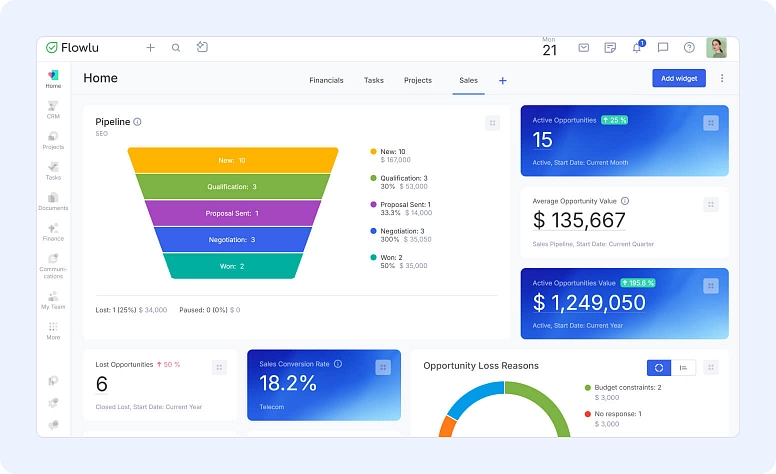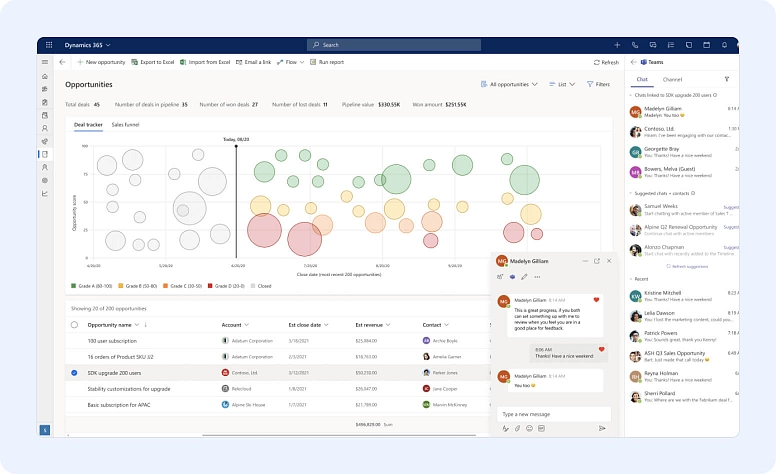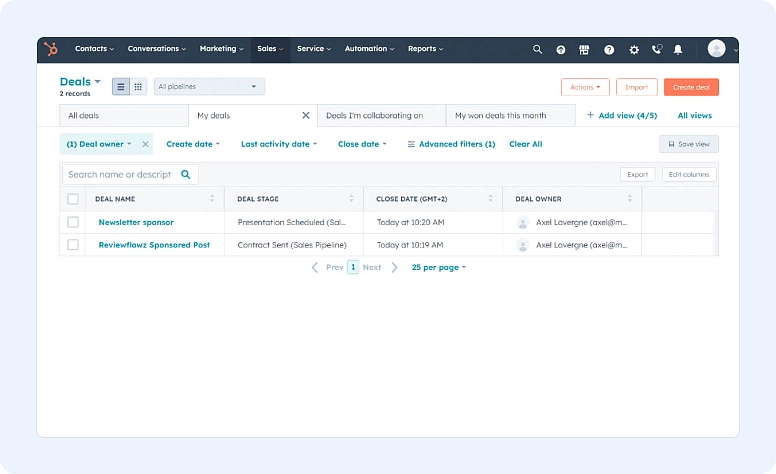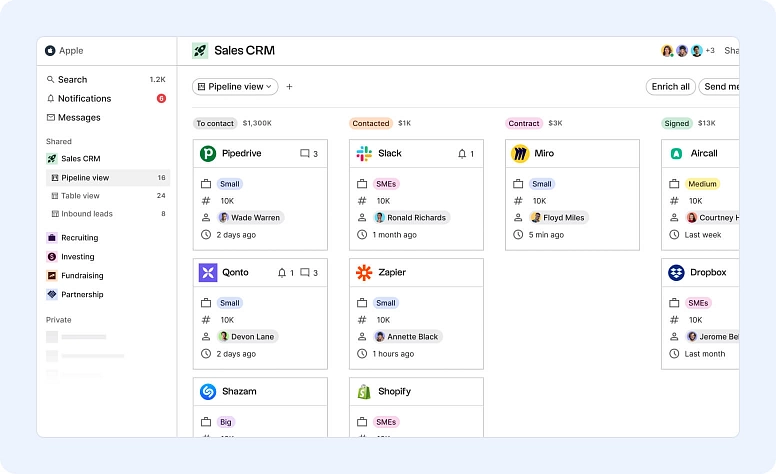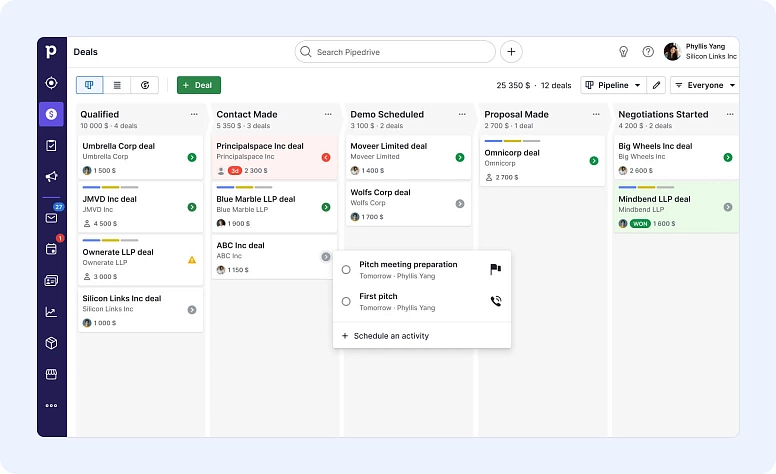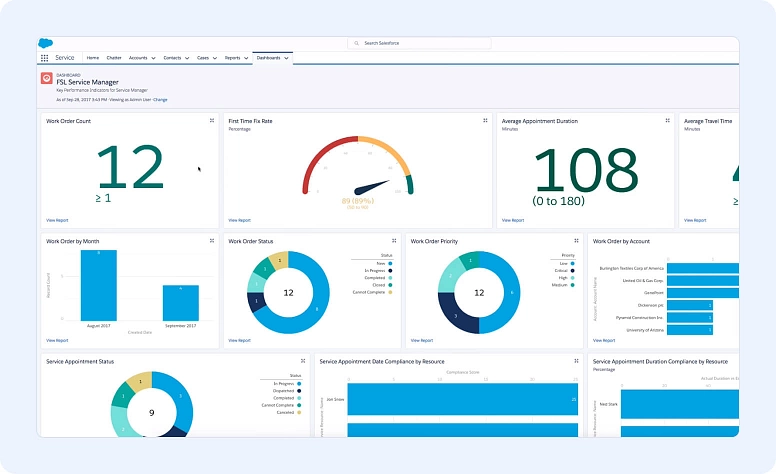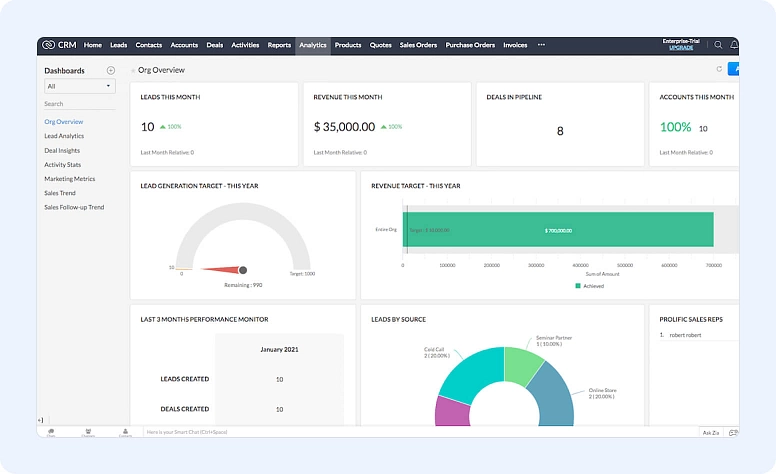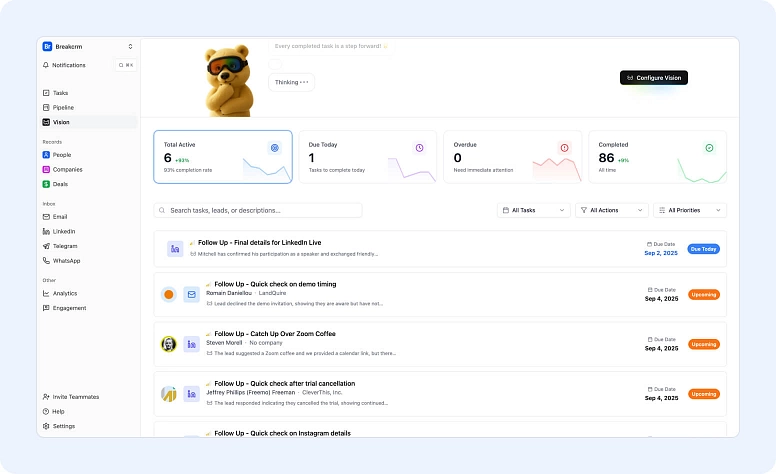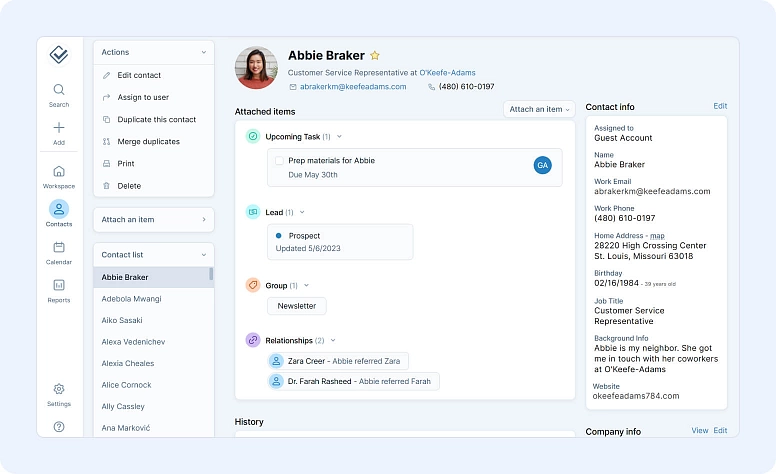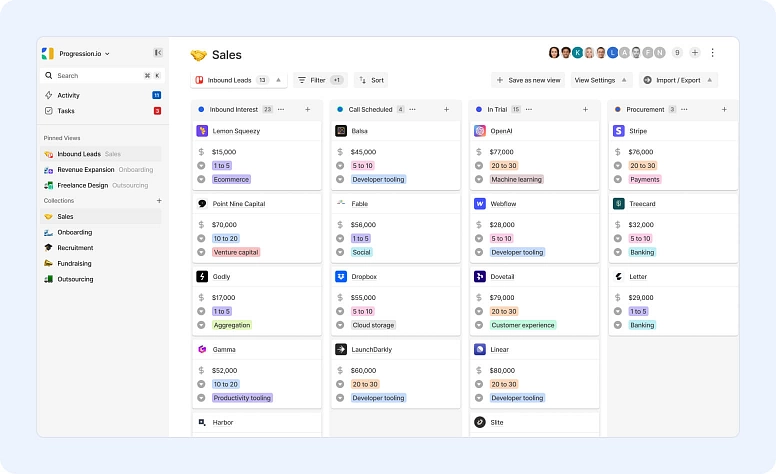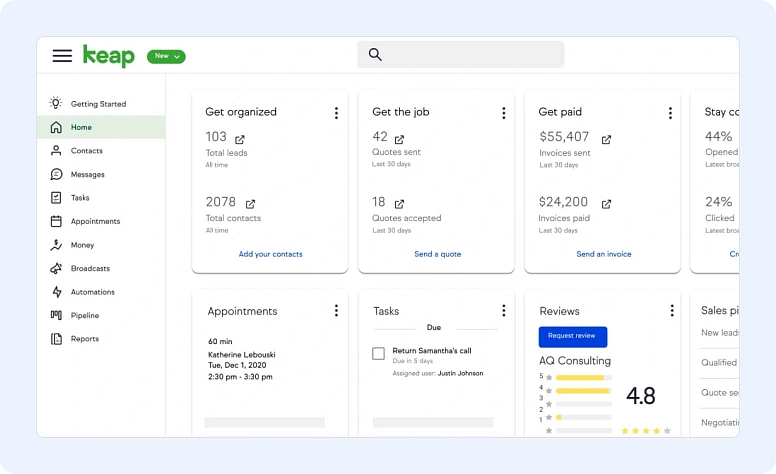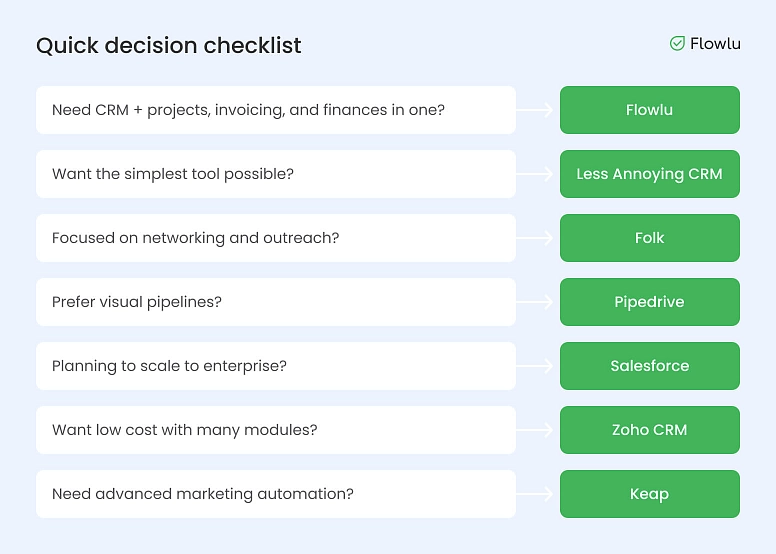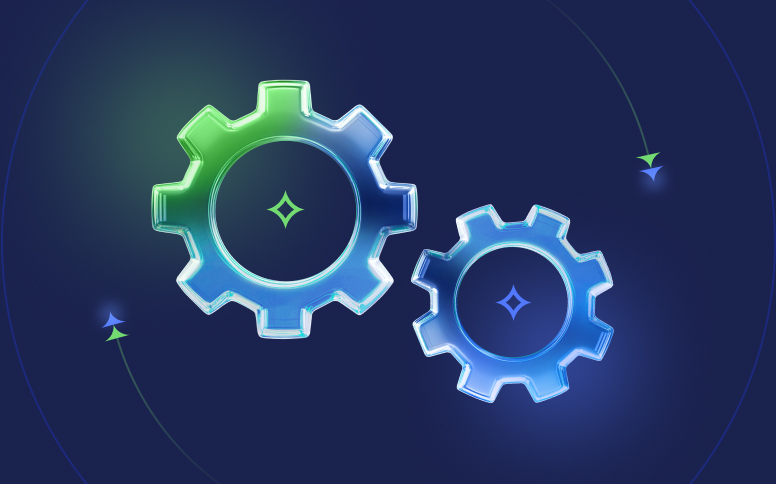Best CRM for Solopreneurs in 2026: 11 Tools Compared
Being a solopreneur is not easy. Some people think it looks simple and envy it, but in real life you handle many things at the same time. You manage clients, do paperwork, and finish the actual work all together.
The good news is you are not alone. Many other solopreneurs also want to make their work easier and more productive. A CRM can help you do this and save time.
What is a CRM for solo entrepreneurs?
Simply put, a CRM (customer relationship management) for solopreneurs is a tool that makes your work easier. A good CRM helps you automate tasks you usually do by hand, organize your work better, keep track of leads, and manage customer contacts and relationships. All this from one simple platform.
Why do all solopreneurs need a CRM
We’re not asking here, we’re stating it: every solopreneur needs a CRM system. It’s crucial to ensure that you have all the tools you need to make your business grow. And one of these tools is, for sure, a CRM.
Here are some of the challenges that a CRM system can help you overcome:
#1: Never miss a lead
Getting a good lead is not easy, so you cannot lose it. But time is short, and sometimes you forget to follow up. With a CRM, you can set reminders and send automatic emails, so you don’t lose the lead.
#2: Handle routine tasks
We all know that data entry and invoicing are just two task examples that you need to take care of. However, why keep doing everything from scratch if you can have a tool that helps you with these tasks using automation? Besides being quicker and more efficient, you’ll also avoid errors and mistakes at the same time.
#3: Get a clear view of your sales process
Is your sales process optimized? Do you have a good idea of how it works? You may be leaving a lot of money on the table because you can’t visualize it. However, even a free CRM for solopreneurs allows you to see your sales funnel and helps you prioritize the deals that require more attention.
#4: Get better insights about your customers
Analyzing customer behavior can be incredibly helpful for businesses, including solopreneurs. With a CRM system on your side, you’ll finally get to know your customers like never before, and you’ll be able to create a customer persona. With this knowledge in hand, you can then build marketing campaigns that attract these potential customers more easily because you know their needs and wants.
#5: Keep your data centralized
When you’re using a CRM system, you’ll have all your business data in one place, making it easy to find what you’re looking for. For example, imagine that an old customer calls or emails you asking for a specific project. With a couple of clicks, you can access this customer’s complete history and give them the best answer.
#6: Target different customers
While you may already have a clear profile of your customer, you may want to start offering other kinds of services or products. This means that you’ll need to target different customers, which can be easily done with a CRM system using audience segmentation, for example. Even within your current customers, you may want to create some segmentation.
9 features the best CRM for solopreneurs needs to include
As you can imagine, not all CRM systems are the same. Some are specific to an industry, some are incredibly complex and only meant for large companies, and some are simpler, which makes them perfect for solopreneurs and small businesses.
Here are some of the most important features the best CRM for a one-person business should include:
#1: Simple and easy-to-use interface
You need a tool that makes life easier, not harder. So, the CRM you choose should have a simple interface you can use right away. It should be easy to click and find the main features in one or two steps.
#2: Customizable dashboards
While you may want to take a closer look at sales metrics, another solopreneur may prefer to have the main dashboard show all the tasks related to current projects. This is a personal preference, not something that can be considered right or wrong. Having customizable dashboards is definitely a must-have feature to look for.
#3: Workflow automation
As already mentioned above, one of the biggest advantages of using a solopreneur CRM is that you can automate some of your tasks. Not only will you save time that can be used for more important work, but you’ll also reduce errors. Some of the tasks you can automate include updating contact details and sending follow-up emails.
#4: Contact organization
When you’re using a CRM tool, you’ll have all your data in one place. This includes your customer’s information. This means that whenever you need details about a customer — such as preferences, purchase history, or previous interactions — you can access it with just a couple of clicks.
#5: Email integration
Using a CRM system means you can manage everything on one platform, including checking and replying to email. There’s no need to switch to a different tool to answer a customer. You should be able to do it right from the dashboard.
#6: Visual sales pipelines
It’s important to always have a clear overview of your sales pipeline. A visual pipeline is much more intuitive and lets you see information at a glance. When you use this tool properly, you’ll quickly identify bottlenecks and prioritize actions.
#7: Integrations
Most CRM systems allow integrations with tools like email and calendar, and this makes perfect sense. When you’re working, you don’t want to keep switching between platforms. You also want to keep using the tools you already rely on alongside your CRM. This is possible as long as you pick a CRM system that supports integrations. If you use a specific tool you don’t want to give up, make sure it connects with the CRM you choose.
#8: Analytics and reporting
You already know the importance of analytics and reporting. You need to track specific metrics and KPIs. Look for a CRM system that not only offers analytics and reporting but also allows you to customize reports to fit your needs.
#9: Mobile app
This is a must-have feature for solopreneurs who need to work on the move. With a CRM system that includes a mobile app, you’ll be able to access all your business data no matter where you are.
In our opinion, these are the most important features the best CRM for solopreneurs should include. However, the best one for you may not have all of these features, or you may require something that isn’t listed here. With that said, it’s time to take a look at the best CRM for solopreneurs in 2026.
The 11 best CRMs for solopreneurs in 2026
When choosing these CRMs, we focused on clear pricing and free trials, core features like contacts, pipelines, email, and automation, positive feedback from solo users, plus mobile access and integrations.
#1: Flowlu
Flowlu is a user-friendly and feature-rich CRM that has been gaining popularity among freelancers over the last year. And this is not just a coincidence. They finally introduced freelancer-friendly pricing plans that let solopreneurs choose a plan per user based on the features they need, and not pay for extra users they don’t need.
Even though this is an all-in-one work management solution, they put a strong emphasis on making their CRM full-featured and not just another add-on. You can keep a database of clients and leads, segment and categorize them, and use them in your campaigns by exporting (or by using the native Mailchimp integration). You can manage your sales opportunities and deals on a kanban board and automate the whole customer journey using built-in CRM automation.
The CRM also integrates your email and telephony, plus it has built-in web forms and a client portal for your clients. The best thing is that for the price (or even lower) of just a CRM tool, you also get professional tools for project and task management, team management and collaboration, a knowledge base (that you can create for your clients), financial tracking, and invoicing. Because business doesn’t stop after the deal is won, right?
- Free trial: 7 days
- Free plan: Yes, for 2 users
- Pricing: Paid plans start from $15 per user
- What users like most: All-in-one setup at a fair price, built-in CRM and workflow automation, and team chat that keeps all communication in one place
- What users say could be better: More integrations with social media platforms
#2: Microsoft Dynamics 365
Integrated within a wide range of Microsoft tools, Microsoft Dynamics 365 is a great option when you’re looking for a good CRM for solopreneurs. With all these tools, you get many visualization options as well as reliable data analysis.
With Microsoft Dynamics 365, you’ll be able to take advantage of predictive analysis using AI, as well as real-time insights and customizable reports.
On the downside, this CRM can be expensive for solopreneurs and may also feel complex if you don’t have an IT team working with you. The learning curve is somewhat steep, making this CRM better if you already have some previous experience.
- Free trial: 30 days
- Free plan: None
- Pricing: Starts around $65 per user/month (for many of the core modules)
- What users like most: Highly customizable and flexible (via Power Platform and extensions), strong integration with other Microsoft products (Office, Teams, Azure)
- What users say could be better: Requires setup by specialists; the UX can feel overloaded or not as modern as other SaaS tools
#3: HubSpot
HubSpot is one of the most popular CRMs on the market. Even though it started as a marketing tool, today it offers a lot more.
With HubSpot, you can use it as a complete CRM system with a user-friendly interface and many automation tools. As with all good CRMs, HubSpot includes email tracking and automation, contact management, and sales pipeline management. It is also divided into three main categories: marketing, sales, and customer service, each with specific tools to bring efficiency to your business.
The downside is that, like Microsoft Dynamics 365, HubSpot can be expensive for small businesses and solopreneurs. The learning curve can also be bigger than expected, and its automation could be more flexible.
- Free trial: 14 days (for premium features)
- Free plan: Yes
- Pricing: Paid plans begin around $45 per user/month
- What users like most: Strong inbound and marketing tools, clean UI, ease of onboarding
- What users say could be better: Some advanced features locked behind higher-priced tiers; customization is sometimes limited compared to enterprise CRMs
#4: Folk
Folk is a CRM built around relationships, especially good for people who network, rely on outreach, or want a lightweight but smart tool. You get a spreadsheet-style interface, contact and deal pipelines, email sync, AI enrichment tools, and the ability to build sequences. It balances simplicity with enough power for outreach workflows.
- Free trial: 14 days
- Free plan: No
- Pricing: Starts around $40 per user/month
- What users like most: Clean UI, strong integrations (email, calendar, LinkedIn), and contact importing from social sources
- What users say could be better: Reporting and dashboards have fewer views or complex metrics than advanced CRMs; filtering and segmentation can feel limited; no fully native mobile app
#5: Pipedrive
Pipedrive is another great CRM designed for small businesses and solopreneurs. With this CRM, you can easily automate your processes and streamline your sales pipelines. In addition, you’ll be able to keep track of all customer interactions.
One of the strengths of Pipedrive is that it’s fully customizable, making it incredibly powerful. It also comes with a mobile app, allowing solopreneurs who are always on the move to stay in constant contact with their business and data.
Even though Pipedrive includes great onboarding materials to help you get started right away, the interface can feel a bit dated and not as intuitive as it should be. Some users also mention that customer support can be slow to respond.
- Free trial: 14 days
- Free plan: No
- Pricing: From about $14 per user/month for the basic plan
- What users like most: Very intuitive, visual pipeline with drag-and-drop interface; good set of integrations via the marketplace
- What users say could be better: Lacks built-in marketing and campaign features; reporting and analytics are less robust compared to other CRMs
#6: Salesforce
When you’re looking for a CRM for a single-user business that can grow with you, Salesforce is worth considering. On the market for many years, Salesforce is a complete CRM system that can help you run data-driven marketing campaigns, streamline sales operations, and manage customer data, all from one place.
Salesforce also includes built-in AI for smarter automation and predictive analysis, along with multiple tools for internal collaboration. In terms of integrations, it’s one of the most extensive CRMs available.
On the downside, Salesforce can be difficult to start with due to its steep learning curve. It may also feel expensive and complex to implement without professional help.
- Free trial: Yes, usually 30 days
- Free plan: No
- Pricing: Entry-level plans start from $25 per user/month
- What users like most: Huge ecosystem of apps (AppExchange), third-party integrations, great reporting and analytics
- What users say could be better: Complexity; more advanced features come at a premium; customization often requires skilled IT consultants
#7: Zoho CRM
Zoho CRM is another popular tool that can help solopreneurs not only manage their business but also grow it. With a wide range of integrations, Zoho CRM includes an intuitive and customizable dashboard, available on both desktop and mobile platforms.
Inside Zoho CRM, you can bring all your communication channels together in one place, making daily work easier. You also get real-time analytics and customizable reports.
On the downside, the platform can be slow to load, and some users experience syncing issues with third-party tools.
- Free trial: 15 days
- Free plan: Yes (for up to 3 users)
- Pricing: Paid plans starting around $14 per user/month
- What users like most: Lots of customization, wide set of modules, large Zoho ecosystem
- What users say could be better: Advanced features (AI, analytics) are reserved for higher tiers; performance and latency issues when managing large amounts of data
#8: Breakcold
In this CRM comparison, we had to mention Breakcold, one of the first AI-native sales CRMs designed for solopreneurs and small businesses. Simply put, you can see it as your own AI assistant. You can use it to organize and manage your contacts, check your most important tasks, and even create workflows from a voice note or a text prompt.
While Breakcold is an interesting tool, it’s still under development, which means you may run into limitations from time to time.
- Free trial: 14 days
- Free plan: None
- Pricing: Paid plans starting from $29 per user/month
- What users like most: Focused on outbound and cold outreach; email sequencing features
- What users say could be better: Limited as a full-scale CRM; lacks a broad feature suite; less mature in integrations, reporting, and workflow automation
#9: Less Annoying CRM
Less Annoying CRM is made for people who want something simple, clean, and effective. It cuts out complexity so you can focus on your contacts, leads, and tasks.
You’ll get a dashboard with contacts, pipelines, tasks, calendar, and notes. It doesn’t try to be everything at once — it keeps the basics solid.
Because of that simplicity, you won’t see advanced automations, built-in email campaigns, or large marketing modules. But for many solopreneurs, that’s fine — you don’t get overwhelmed.
- Free trial: 30 days
- Free plan: No
- Pricing: $15 per user/month (only one plan)
- What users like most: Friendly and responsive customer support; unlimited contacts and pipelines
- What users say could be better: No mobile app; no built-in email marketing or drip campaigns; reporting and analytics are basic
#10: Attio
Attio is a newer CRM built with flexibility and modern workflows in mind. It leans toward customization, no-code design, and smart automations. You can define custom objects, set up relationships between items (not just standard “contacts” and “deals”), sync email and calendar, and use workflow automations and data enrichment.
- Free trial: 14 days
- Free plan: Yes
- Pricing: Starts from $29 per user/month
- What users like most: Highly customizable data models and workflows; modern UI
- What users say could be better: Integrations often rely on Zapier; mobile experience still needs polish
#11: Keap
Keap (formerly Infusionsoft) is a CRM and marketing automation tool that gives small businesses more power without needing multiple separate tools.
Keap handles contact management, sales pipelines, email and SMS campaigns, webforms and landing pages, invoicing and payments, and appointment scheduling — all in one place. It also supports tagging and segmenting contacts, lead scoring, and viewing full contact history (messages, tasks, purchases) in a single view.
On the downside, Keap is more expensive than many CRMs for solo businesses. Because its pricing depends on contact count and number of users, costs can climb quickly as your list grows.
- Free trial: 14 days
- Free plan: No
- Pricing: Plans start at $249/month
- What users like most: Strong automation and campaign tools; guided onboarding and strategy features
- What users say could be better: Costs escalate quickly as contacts or users grow; support (especially live chat) can be inconsistent
|
CRM |
Free plan |
Trial |
From (user/mo) |
Highlights |
Watch-outs |
|
Flowlu |
Yes (2 users) |
7 days |
$15 |
All-in-one: CRM + projects + finance |
No built-in email marketing |
|
Microsoft Dynamics 365 |
No |
~30 days |
$65+ |
Very customizable, Microsoft tools |
Expensive, steep learning curve |
|
HubSpot |
Yes |
14 days |
~$45 |
Strong marketing, clean UI |
Advanced features locked in higher tiers |
|
Folk |
No |
14 days |
~$40 |
Great for outreach, spreadsheet-style |
Limited reporting, no native mobile |
|
Pipedrive |
No |
14 days |
~$14 |
Visual pipelines, drag-and-drop |
No built-in campaigns, weak analytics |
|
Salesforce |
No |
~30 days |
$25 |
Huge ecosystem, reporting |
Complex, setup often needs IT |
|
Zoho CRM |
Yes (3 users) |
15 days |
~$14 |
Customizable dashboards, wide suite |
Slower, some sync issues |
|
Breakcold |
No |
14 days |
$29 |
AI-native, outreach focus |
Still developing, limited features |
|
Less Annoying |
No |
30 days |
$15 |
Very simple, unlimited contacts |
No automation, no mobile app |
|
Attio |
Yes |
14 days |
$29 |
Custom objects, modern UI |
Relies on Zapier, mobile still basic |
|
Keap |
No |
14 days |
$249 |
Strong automation + payments |
Expensive, price grows with contacts |
The best way to implement a CRM
When you’re looking to start using one-person business software, the first thing you need to do is choose the best one for your business. Take a look at the key features we mentioned above and pick the ones that are most relevant for you. Set your budget and compare it with the different CRM tools we covered.
It’s important to understand that there are also free CRM systems on the market, and you may even want to start with one of these. However, if you’re planning to grow your business, you’ll want a tool that grows with you — and many free CRMs can eventually fall short.
As we already mentioned, there are simpler and more complex CRMs for solopreneurs. No matter which one you choose, take some time to set it up and explore all its features. Get familiar with the platform and check any tutorials or onboarding materials the CRM offers.
Over time, everything will feel natural, but at the start it’s important to learn how it all works.
Bottom line
CRMs for solopreneurs should help with more than just improving customer satisfaction. They should help you grow your business with sales pipeline visualization, lead management, client relationship management, sales automation, marketing campaigns, and a personalized dashboard designed for your needs.
Overall, you want a tool that is simple and intuitive, lets you work more efficiently, and supports automation and integrations.
In this article, we shared the most important features to look for in a CRM for solopreneurs, along with some of the best options. Now it’s your turn to explore and decide which one is right for you.
The sooner you start using one, the better. It will save you a lot of time entering data later. And there’s nothing like starting on the right foot.
Price is always important, even for larger businesses. But you need to look beyond cost alone. Consider the balance between price and what the CRM offers — the time you save, the insights you gain, and how it supports better decisions in the future.
It depends on the CRM. Some are ready in less than one hour. Others with more features take more time. Most CRMs give guides or tutorials to help you start faster.
Yes, you can. Most CRMs let you export contacts, deals, and notes. But moving takes time, so it is better to pick a CRM that can grow with your business.
No, you don’t. Many CRMs for solopreneurs are simple to use. For advanced CRMs, you may need a little learning, but there are tutorials and support to help you.
Yes. Most CRMs let you import contacts from a spreadsheet or another system. Some even give step-by-step wizards to make it easy.
Start with contacts, deals, and notes, the core information you use every day. Later, you can bring in extra data like documents, invoices, or emails if your CRM supports it.








